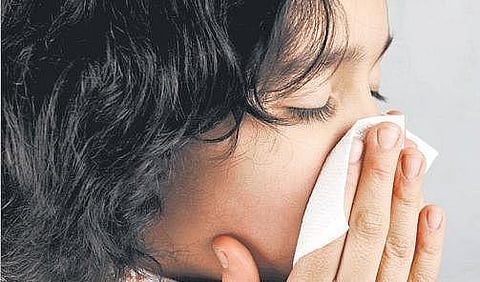

BENGALURU: Paediatricians, pulmonologists and allergy specialists are asking daycare centres and schools to check their premises thoroughly for mold, dust mites and yeast. They say it is important to understand environmental factors contributing to the alarming rise in respiratory chronic diseases among children. Several daycare centres and schools have reopened after two-and-half years and the management needs to go through ‘Facility Management’ aspects to prevent these.
“When schools reopen, it is not only important to look at logistics, infrastructure and mental adjustments from online to offline, but also the safety and infrastructure aspects. Unused areas tend to collect dust, yeast, fungus, mold and other allergens. So it is important that these areas are cleaned up. Wet areas, roofs and other parts should be thoroughly checked. Mold, fungus and dust mites are known allergens and can cause respiratory disorders,” said Dr Ravindra Mehta, Senior Pulmonologist, Apollo Hospitals.
According to experts, an environment where there is movement is generally neat and clean, but an area shut for many years needs to go through ‘Facility Management’ when reopened, so that it is safe for people to return. As schools and daycare centres have been shut for a long time, cases of respiratory disease will start showing up in children and adults, if these aspects are not taken care of.
Dr Yogesh Kumar Gupta, Head of Paediatric Intensive Care Unit, Fortis Hospitals, Bannerghatta Road, says, “Molds are known to cause various respiratory ailments and this has been proven over time. They can cause issues from simple rhinitis to acute severe asthma attacks in susceptible individuals. The best way to prevent this is to provide good sunshine and ventilation along with regular cleaning and vacuuming.”
Warning that children may show symptoms of worsening of asthma, coughing, wheezing, nasal congestion, sore throat, sneezing, rhinitis and even rare forms of chronic respiratory disease known as hypersensitivity pneumonitis due to indoor molds, Dr Balachandra B V, Consultant, Paediatric Allergy, Manipal Hospital, Airport Road, says that decreasing dampness is important. “Schools should repair indoor water leakages, if any, replace carpets with hard flooring, replace wallpapers with paint, ensure ventilation is provided and use 5% ammonia solution to remove mold from bathrooms,” he suggested.
Meanwhile, if a child is suffering from regular cough and sneezing, and molds are present in indoor spaces, parents can meet an allergy specialist to get an allergy test to confirm that the child’s symptoms are due to mold. Also, usage of prescribed antihistamines (anti-allergy medicines) can be given, say doctors.
Dr. Rajath Athreya, Senior Consultant and HOD Paediatrics & Neonaotology, Sakra World Hospital, said, "Allergy and asthma in children is on the rise and one of the reasons is environmental exposure to allergen and air pollution. Parents who are worried can keep a symptom diary – see if things are worse on school days rather than at the weekend. A detailed discussion with your pediatrician and a pediatric allergist will help identify specific problems and avail treatment."